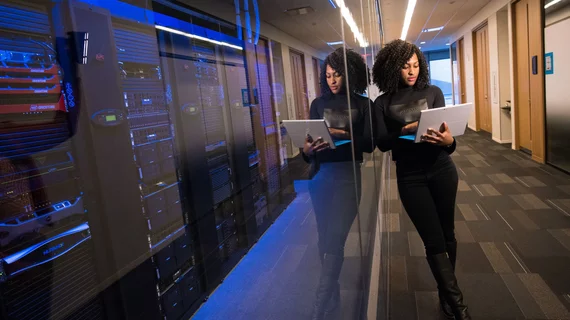Image-based data commons enjoying fast growth thanks to RSNA, ACR, other contributing orgs
A multi-institutional image-data repository launched to support AI-based research into COVID-19 has been the beneficiary of more than 30,000 anonymized imaging files from the Radiological Society of North America alone.
RSNA announced the milestone June 2, saying the open-access Medical Imaging and Data Resource Center—MIDRC, pronounced midric—has taken less than two years to “[realize] the benefits of new algorithms and the resulting innovations in machine learning.”
The MIDRC project is funded by the National Institute of Biomedical Imaging and Bioengineering (NIBIB) and hosted at the University of Chicago.
Along with RSNA, lead contributing associations are the American College of Radiology (ACR) and the American Association of Physicists in Medicine (AAPM).
The MIDRC website shows the project had ingested almost 125,000 imaging studies as of late April. Of these, close to 95,000 are undergoing data harmonization and some 29,630 have already been released to the public.
MIDRC says it also receives COVID-19 images and data through intake portals at the Cancer Imaging Archive.
The idea is to supply a single access point for researchers, taking in and harmonizing data from new and varied sources over time. Current and forthcoming sources include academic medical centers, community hospitals and others, and the resources offered by MIDRC are open to registered users from academia and government, MIDRC says.
In the announcement, RSNA’s board liaison for information technology, Curtis Langlotz, MD, PhD, of Stanford University, says the society is “delighted to collaborate on the development of … a massive, curated, diverse, multi-institutional imaging dataset that enables new insights about the diagnosis and prediction of COVID-19 infection, its complications and its outcomes.”
MIDRC.org notes the work is “aimed at accelerating the transfer of knowledge and innovation in the current COVID-19 pandemic and beyond.”
RSNA milestone announcement here.
More Coverage of COVID-19 Imaging:
Radiologists best AI at diagnosing COVID on chest X-rays
Imaging shows COVID vaccines effective at warding off pulmonary embolism
Lung damage appears to persist one year after COVID-19 pneumonia, new CT study reveals
Small airway disease a potential long-lasting effect from COVID-19, new Radiology study warns

